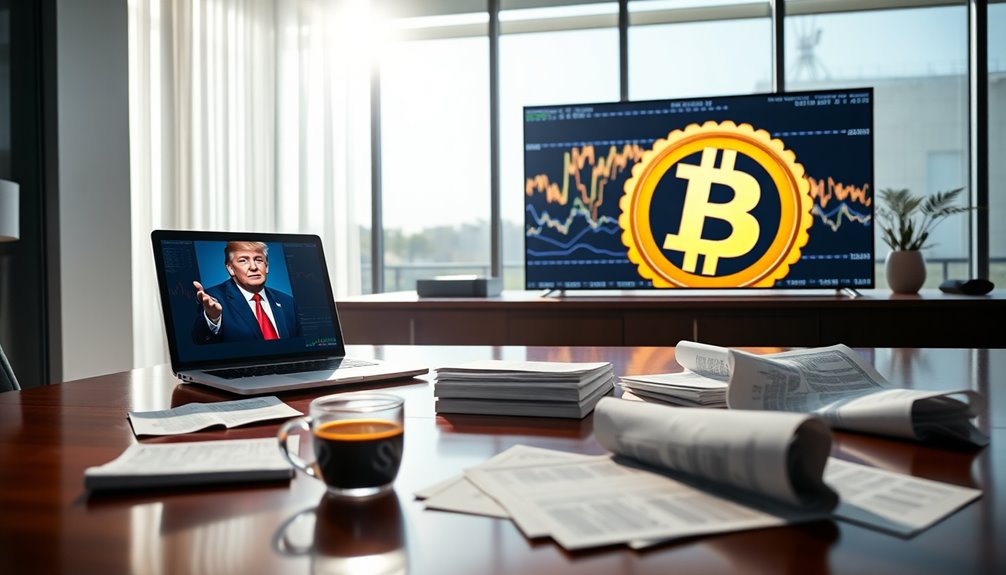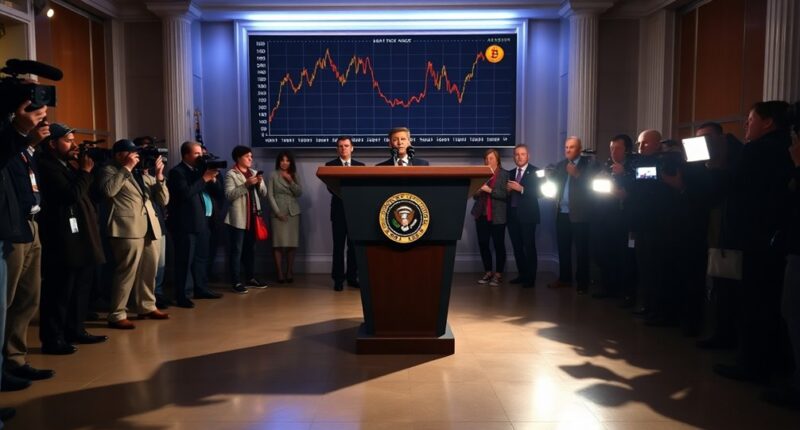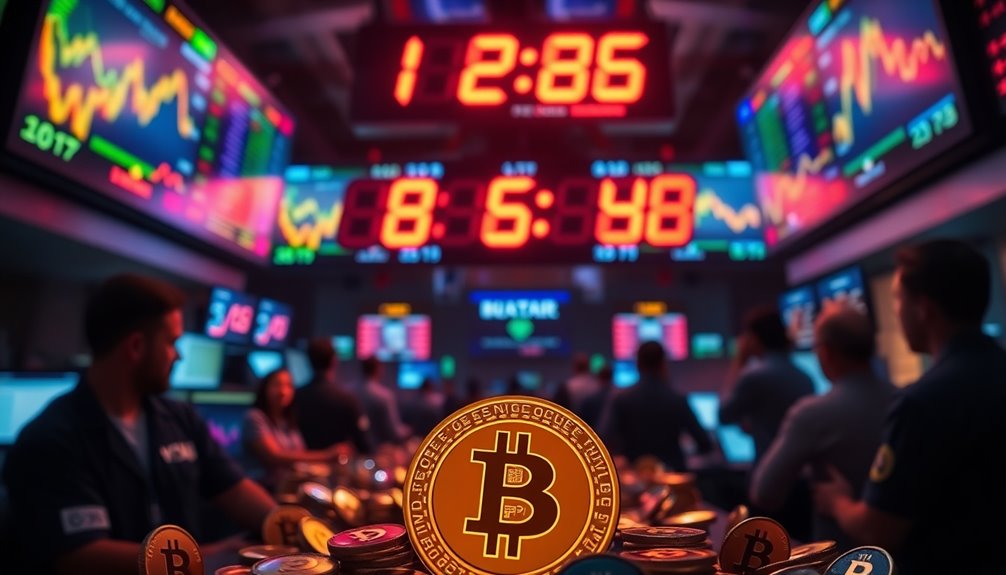Trump's Day 1 initiatives, including a Crypto Executive Order and a national Bitcoin reserve, are poised to transform the digital asset landscape in the U.S. The establishment of a Crypto Advisory Council shows a shift in approach, potentially leading to favorable regulations for the industry. Despite the significance, these moves seem to have flown under the radar. Curious about how these changes could impact the crypto market? There's more to uncover about this evolving situation.
Key Takeaways
- The proposed Crypto Executive Order aims to reshape digital asset regulation, signaling a potential shift in the Biden administration's previous approach.
- The establishment of a national Bitcoin stockpile reflects the government's commitment to digital assets and could influence market dynamics significantly.
- The anticipated regulatory environment may become more favorable, with potential repeals of stringent SEC restrictions for banks holding digital assets.
- Market reactions are mixed, with some optimism about pro-crypto policies leading to surging Bitcoin prices ahead of Trump's inauguration.
- Future implications for the crypto industry include a possible increase in innovation and legitimacy, contingent upon clear regulatory frameworks and industry cooperation.

As Trump steps back into the political arena, his proposed Crypto Executive Order is set to reshape the landscape of digital assets in the U.S. This executive order aims to establish a Crypto Advisory Council, which will incorporate crucial industry perspectives into the administration's decision-making process. If you're invested in crypto or just curious about its future, this council could signal a significant shift away from the Biden administration's regulatory approach, which has seen over 100 enforcement actions against crypto firms.
You'll want to pay attention to how this executive order requires all government agencies to review their digital asset policies. It's a clear indication of a more accommodating stance towards the crypto industry. Moreover, there's potential for the ongoing litigation against major firms like Ripple Labs and Binance to be paused, which could provide the much-needed breathing room for these companies to operate more freely. Additionally, the implementation of predictive analytics could play a significant role in anticipating the impact of these regulatory changes on the market.
Another exciting aspect of the proposed order is the potential consolidation of around $20 billion in Bitcoin currently held by the U.S. government. This could create a national Bitcoin stockpile that not only symbolizes the U.S.'s commitment to digital assets but could also have profound implications for the market. With Trump's history of supporting crypto—such as his appearance at a Bitcoin conference where he pledged to position the U.S. as a global leader—there's a palpable sense of optimism among industry insiders. Additionally, the establishment of a national Bitcoin stockpile could streamline the management of governmental crypto assets.
Initial reactions from the crypto community have been a mix of anticipation and speculation. While Trump’s Day 1 didn’t mention crypto, many leaders are predicting forthcoming policies that could positively impact the market. The administration’s plans to enable banks to hold digital assets more easily could lead to the repeal of some stringent SEC restrictions, further fostering an environment conducive to crypto innovation. As discussions around regulatory frameworks gain momentum, experts are eager to see how these changes will shape the landscape of digital currencies. Additionally, there is growing curiosity about how Trump’s memecoin impact on crypto could influence both investor sentiment and market dynamics. If tangible policies emerge that support memecoins and other digital assets, it may spark a new wave of interest and investment in the cryptocurrency space, driving prices to new heights.
As you consider the potential outcomes, it's essential to recognize the pressing need for clear regulatory frameworks. Trump's administration seems poised to tackle this with favorable regulations, which could lead to a more stable market landscape. The appointment of heads for regulatory agencies like the SEC and CFTC will also play a crucial role in shaping the future of the industry and signaling the administration's priorities.
With speculation swirling around potential pardons and executive orders, the crypto market is already reacting. Bitcoin prices surged to record highs ahead of Trump's inauguration, reflecting a positive market sentiment fueled by the administration's pro-crypto stance. The integration of blockchain services into traditional financial systems could address ongoing concerns about stability and compliance, further legitimizing digital assets in the eyes of the public and investors alike.
Frequently Asked Questions
How Will the Crypto Executive Order Impact Global Markets?
The crypto executive order could significantly impact global markets by establishing clearer regulations for digital assets.
You might see increased confidence from investors as guidelines emerge, potentially driving more institutional participation.
If the U.S. government creates a strategic bitcoin reserve, it could legitimize bitcoin further, influencing its price and adoption worldwide.
Traders will likely react to these changes, possibly stabilizing the market and encouraging a long-term bullish outlook on cryptocurrencies.
What Specific Regulations Might Follow the Executive Order?
You might see several specific regulations following the executive order.
A Crypto Advisory Council could form, guiding policy development.
Additionally, the reversal of restrictive regulations like SAB 121 could ease burdens on companies holding crypto.
Addressing concerns about "Operation Choke Point 2.0" may ensure fair access to financial services for crypto firms.
Lastly, discussions about a national bitcoin stockpile could emerge, impacting how the U.S. interacts with its digital assets.
Who Are the Key Stakeholders in This Crypto Initiative?
In this crypto initiative, you'll find several key stakeholders.
Government agencies like the SEC and CFTC play crucial regulatory roles, while the Treasury Department manages potential Bitcoin reserves.
Industry leaders, including David Sacks and Bo Hines, advocate for digital asset policies.
Regulatory appointees like Paul Atkins at the SEC influence innovation.
Additionally, congressional representatives, including Sen. Cynthia Lummis, will scrutinize and shape legislation regarding cryptocurrencies and national reserves.
What Are the Potential Benefits of Bitcoin Reserves?
When considering the potential benefits of Bitcoin reserves, you'll find several key advantages.
First, Bitcoin acts as a hedge against inflation due to its fixed supply.
It also offers portfolio diversification since it's not closely tied to traditional assets.
Additionally, adopting Bitcoin can position your country as a tech leader, attracting investment and talent.
Lastly, the blockchain's transparency ensures accountability, making it harder to manipulate reserve figures.
How Might This Influence Future U.S. Monetary Policy?
The influence of bitcoin reserves on future U.S. monetary policy could be significant.
You might see a shift towards more flexible, crypto-friendly regulations that encourage innovation. This could lead to faster transactions and reduced fees in the financial system.
As the government integrates cryptocurrencies, expect increased stability and lower volatility, enhancing trust in digital assets.
Ultimately, you could witness a more dynamic economy driven by the adoption of blockchain technologies and stablecoins.









